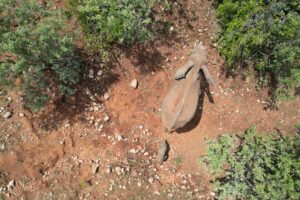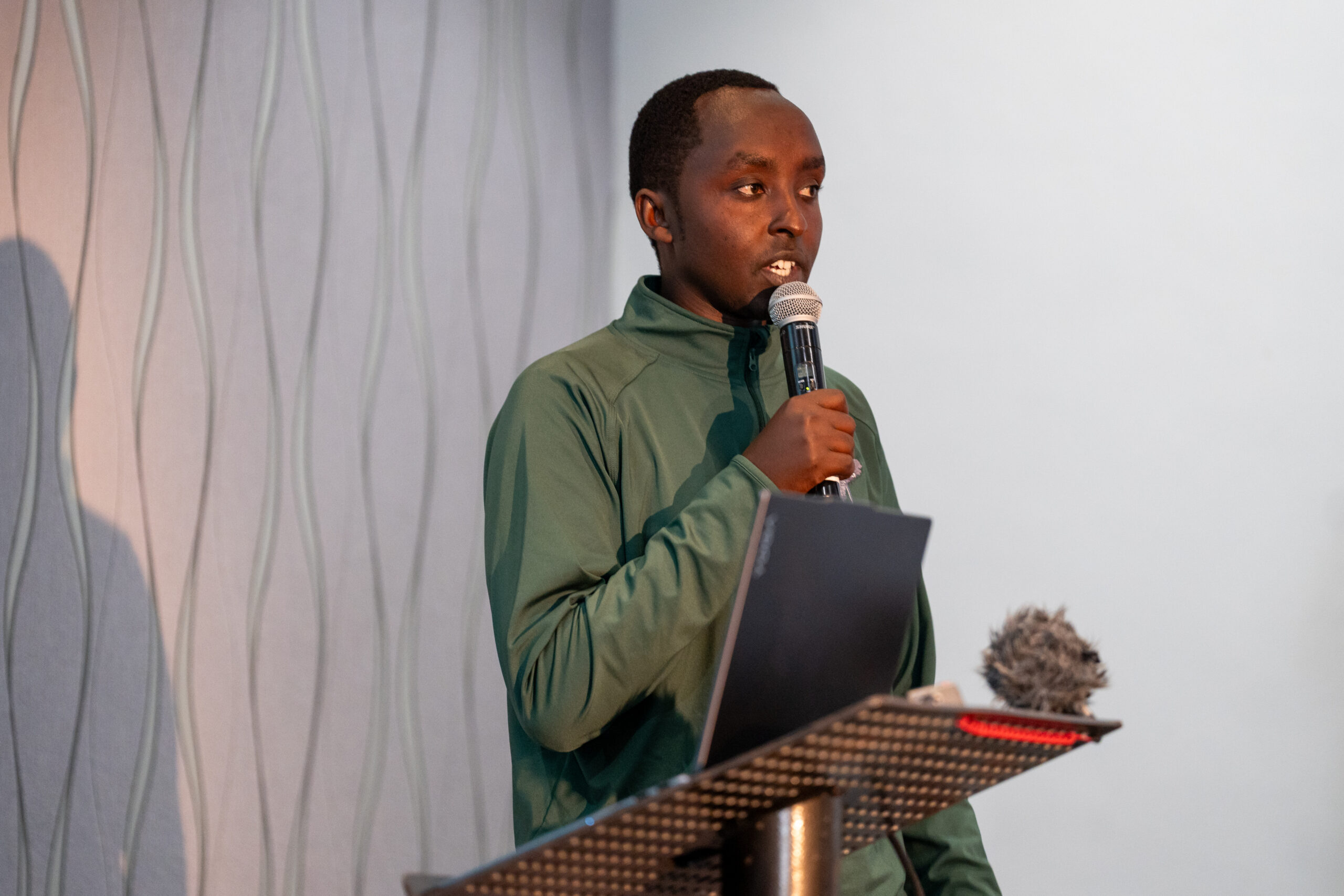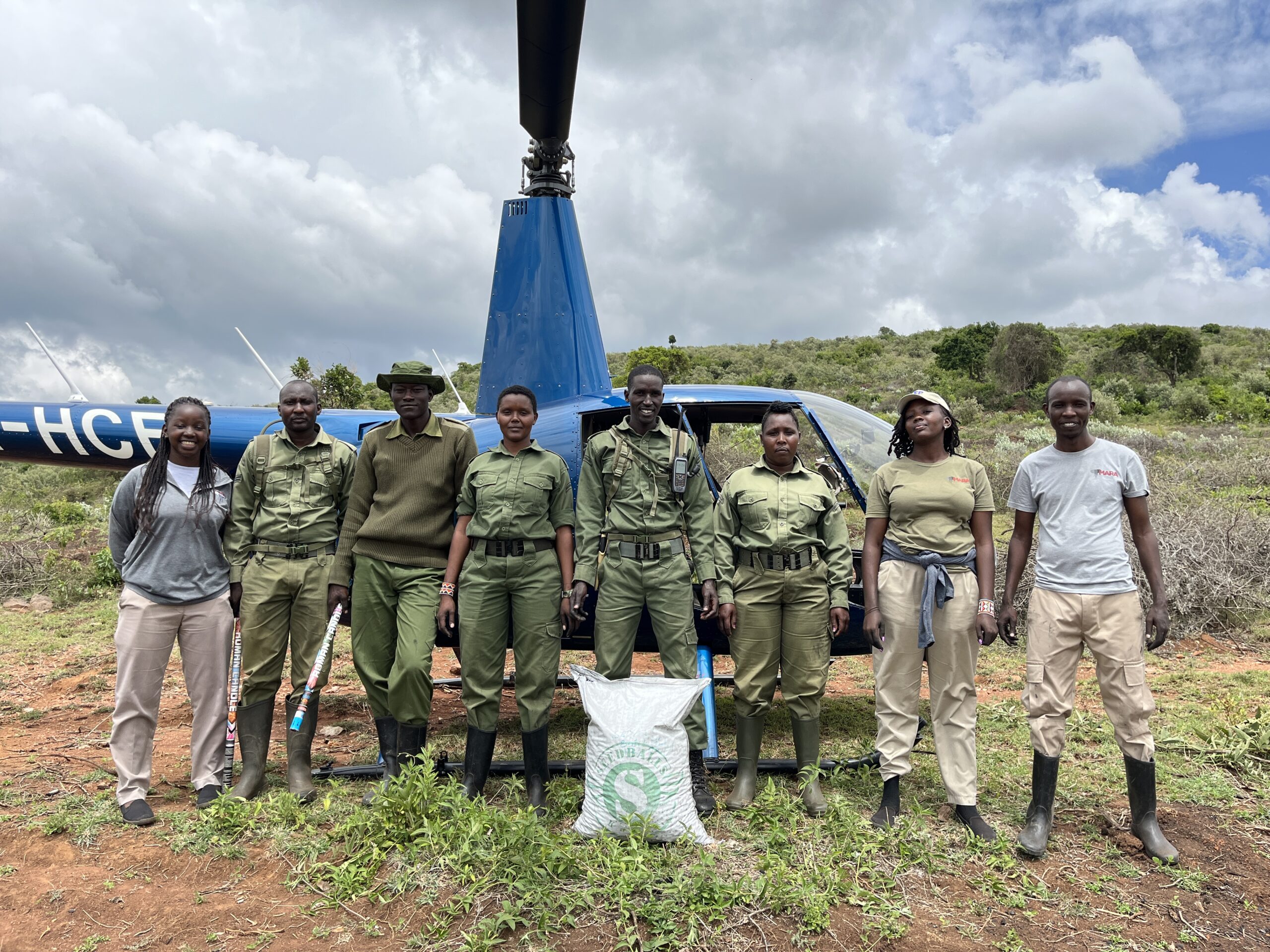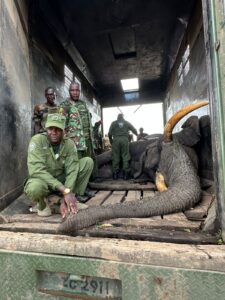Monitoring of the Wildlife Research and Training Institute (WRTI), Kenya Wildlife Service (KWS) and Mara Elephant Project collared elephants was made more accessible thanks to drones. In November, the mobile ranger team deployed a drone to look for collared elephant Lempiris and in December, Fred’s collar triggered a low-speed alert, prompting rangers to deploy a drone to closely monitor him, and luckily, he was observed doing well in Oloisukut Conservancy. Collared elephant Indy was monitored alongside her less than 2-year-old calf using a drone and, on the ground, collared elephants Audrey, Hannibal, Clara, Matali, Ivy, Bea, Gwen, Kegol, Polaris and Kiambi were all monitored in the fourth quarter.
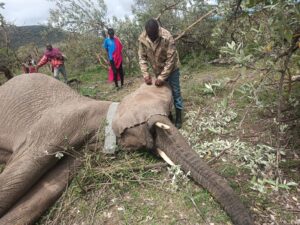 WRTI, KWS and MEP re-collared three elephants in the fourth quarter. In October, collared elephant Ritan left the Sachangwan area which is at the north end of the Mau Forest and traveled over 90 kilometers as the crow flies to the border of the Lake Nakuru National Park. Ritan, a bull elephant, was originally collared in June 2020 to better understand his movements and respond to conflict. His movements in October presented a good opportunity to continue his monitoring by replacing his collar. During the last week of November, both Clara and Audrey received new tracking collars. These two females can oftentimes be found in each other’s company sometimes combining family herds with another collared elephant Indy. Their continued monitoring allows us to rapidly respond to conflict and better understand the connectivity between the Rift Valley, Loita Plains and the Mara through an area where infrastructure is expanding. Both were also fitted with the latest solar powered elephant collar in hopes of extending the battery life.
WRTI, KWS and MEP re-collared three elephants in the fourth quarter. In October, collared elephant Ritan left the Sachangwan area which is at the north end of the Mau Forest and traveled over 90 kilometers as the crow flies to the border of the Lake Nakuru National Park. Ritan, a bull elephant, was originally collared in June 2020 to better understand his movements and respond to conflict. His movements in October presented a good opportunity to continue his monitoring by replacing his collar. During the last week of November, both Clara and Audrey received new tracking collars. These two females can oftentimes be found in each other’s company sometimes combining family herds with another collared elephant Indy. Their continued monitoring allows us to rapidly respond to conflict and better understand the connectivity between the Rift Valley, Loita Plains and the Mara through an area where infrastructure is expanding. Both were also fitted with the latest solar powered elephant collar in hopes of extending the battery life.
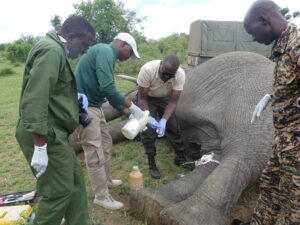 Collared elephant David is a transboundary elephant WRTI, KWS and MEP monitor to better understand how he’s navigating an increasingly complex landscape and respond to conflict. While David spends 90% of his time in Kenya, he does move into Tanzania where our protection efforts stop. After receiving an alert from his tracking collar that David crossed back into Kenya in November, the MEP long-term monitoring (LTM) team set out to monitor him in the field. What they discovered was a wound on his back leg that needed immediate vet intervention. Our partner KWS Vet Dr. Njoroge from the Sheldrick Wildlife Trust Mobile Vet Unit responded and successfully treated his wound.
Collared elephant David is a transboundary elephant WRTI, KWS and MEP monitor to better understand how he’s navigating an increasingly complex landscape and respond to conflict. While David spends 90% of his time in Kenya, he does move into Tanzania where our protection efforts stop. After receiving an alert from his tracking collar that David crossed back into Kenya in November, the MEP long-term monitoring (LTM) team set out to monitor him in the field. What they discovered was a wound on his back leg that needed immediate vet intervention. Our partner KWS Vet Dr. Njoroge from the Sheldrick Wildlife Trust Mobile Vet Unit responded and successfully treated his wound.
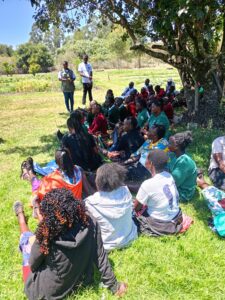 The MEP Co-Existence Farm team participated in their last educational activity for 2023 by joining 40 students on World Habitat Day to discuss global green has emissions and plant trees.
The MEP Co-Existence Farm team participated in their last educational activity for 2023 by joining 40 students on World Habitat Day to discuss global green has emissions and plant trees.
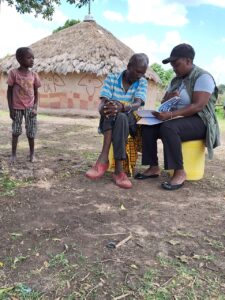 The farm team also conducted the first of three social surveys in nearby communities with the aim of understanding people’s willingness to adapt to crops not palatable by wildlife. They also started an indigenous tree seedling nursery on the farm which will be used to grow trees to distribute for planting in degraded areas. The kitchen garden was upgraded in the fourth quarter and Farm Manager Abigael attended the Africa Leadership Academy workshop put on by the Mastercard Foundation and Africa Career Networks. The fourth quarter had a high amount of rainfall, which fed the weeds and caused water logging leading to the degeneration of roots. On the good side, the high rainfall improved grasslands in conservation areas bordering the farm which reduced predation in the farm from hippos and elephants while birds and vervet monkeys frequented the ripe produce like tomatoes and gooseberries. Additionally, the local community members were coming to the farm in search of seedlings for their kitchen gardens to take advantage of the rain.
The farm team also conducted the first of three social surveys in nearby communities with the aim of understanding people’s willingness to adapt to crops not palatable by wildlife. They also started an indigenous tree seedling nursery on the farm which will be used to grow trees to distribute for planting in degraded areas. The kitchen garden was upgraded in the fourth quarter and Farm Manager Abigael attended the Africa Leadership Academy workshop put on by the Mastercard Foundation and Africa Career Networks. The fourth quarter had a high amount of rainfall, which fed the weeds and caused water logging leading to the degeneration of roots. On the good side, the high rainfall improved grasslands in conservation areas bordering the farm which reduced predation in the farm from hippos and elephants while birds and vervet monkeys frequented the ripe produce like tomatoes and gooseberries. Additionally, the local community members were coming to the farm in search of seedlings for their kitchen gardens to take advantage of the rain.
Members of the MEP team joined over 400 people from conservation organizations around the globe at the EarthRanger User Conference hosted in Cape Town. MEP Special Projects Manager Wilson Sairowua presented about using drones as a tool for conflict mitigation and wildlife monitoring and over 60% of conference participants attended his lively session. Alongside partners, he presented on how technology is being used to solve conservation challenges. MEP Director of Research and Conservation Dr. Jake Wall, co-founder of EarthRanger, presented about Ecoscope, a MEP developed technology, and was honored to be invited to sit alongside conservation partners for the Elephant Protection Initiative panel discussing elephant conservation. MEP also hosted several members of the EarthRanger team at our headquarters in Lemek Conservancy after the conference. The team got an opportunity to learn more about MEP and how we are using EarthRanger to safeguard wildlife, their habitats, and people.
Finally, MEP participated in a new holiday in Kenya, National Tree Growing Day. MEP rangers and the members of the (LTM) team distributed seedballs from Seedballs Kenya on the ground while the MEP helicopter dropped them from the air on degraded areas. Overall, the MEP team spread 60,000 seedballs with acacia seeds, which provide a range of ecosystem services and other benefits like food for wildlife, nesting sites for birds and insects and they are renowned for their use in traditional medicine in Kenya.
